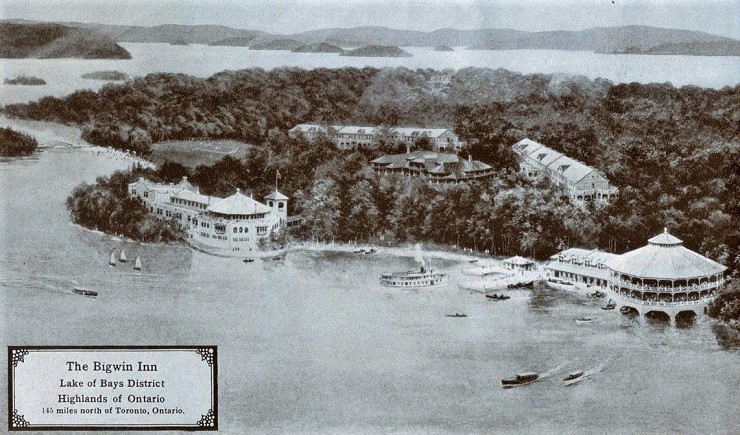DUE NORTH: SONGS OF MUSKOKA … AND LAKE OF BAYS, PART 2
Stephen Richards | Special to MuskokaTODAY.com | FICTION
A Pavilion in Muskoka, Summer of 1943
Beatrice, ‘Trixie Orange’ to her friends, is twirling around in some form of a square dance in her orange tulip print dress. The letter ‘B’ is embroidered on the front over her heart. She is 5 in a strange land, whisked away from her homeland May 1940 aboard a Dutch cruiser, through Halifax to Ottawa. Her family is offered asylum by the Earl of Athlone for most of the year at ‘Storm-Away’ as she calls it and also at a windy place elsewhere for the summer.
In this windy place, her mother knitted scarves and sweaters for Canadian soldiers, volunteered for fundraising efforts and gave blood to the Red Cross. She is currently watching through the balustrades above. ‘Juliana’ is what her dad calls her and she is tending to Margriet born this past January 18, swaddled in a blanket adorned with a daisy-like flower (that was blooming back home when they left) after which she is named. Trixie’s other sister Irene , 4, is seated on the floor in front of a band, mesmerized by the sounds, wobbling and bobbing to the beat.
Juliana stands up, calling to Trixie “Enjoy the summer here (inferring because in the fall they will return to Storm-Away and continue her primary education at RockCliffe Park Public School).” And then to the band — “Would you mind watching Trixie for me? It’s nap time for Irene and Margriet and I need to put some documents away in the Rotunda Building.”
The band stops playing. Howard lets the others have some time off socializing while he volunteers to entertain Trixie until Juliana returns. Howard opens the door and Trixie follows him outside as a wind gusts off the lake. He looks up at the flag flying above the Rotunda.
He asks Trixie about her dad and she says: “He’s in London learning to fly.” Howard grimaces. And clears his throat to tell a story:
“Some time ago, Nakomis accidentally cut the bark of a tree, noticed the running sap, tasted it and found it sweet. While boiling some venison, the copper pot started to run dry. Since the water source was too far away, she added tree sap instead and to her delight discovered a rich new food — maple syrup. Later she boiled down some more sap and stored it in birch boxes. One time she became distracted, boiled it even longer and made maple sugar.”
Trixie’s eyes widen and sparkle with delight as he hands her a maple sugar candy wrapped in wax paper.

Ellezelles, Belgium, 2012
Merci Beaucoup Pirouette is a retired private detective. According to his tailor, he is 5-foot-4, but seems taller carrying himself as he does with great dignity. Being frugal, but not cheap, he spends his and his clients’ money wisely. The neatness of his attire was almost incredible; a speck of dust would have caused him more pain than a bullet wound.
Yet this quaint dandified little man who limped badly, had been in his time one of the most celebrated members of the Belgian police, reaching the rank of Captain. His head is egg-shaped and he always perches it a little to one side. His moustache is very stiff and military. His green shiny eyes are cat- like, his grey hair is brilliantined. He has a sensitive stomach. Always punctual he carries a pocket-watch even in this day and age.
His detective methods are fairly conventional, being clue-based and deductive; this is reflected in the use of his vocabulary by two common phrases: “The little grey cells” and “Order and method.”
One day in 2012 he is called out of retirement on a sensitive matter by Queen Beatrice. He hopes the assignment will not take too much of his time away from tending to his vegetable marrows.
Pirouette is seated at his breakfast nook contemplating the two non-symmetrical soft boiled eggs his maid places in front of him. He turns the pewter double-egg cup this way and that with his mouth agape, head tilted away from the serving dish. And rubs his belly as it grumbles.
The phone rings, he pushes the egg cup away and takes a sip of his double espresso.
“Pirouette does not blame you madame. He blames the chicken. Mon Dieu! Every hen lays an egg of a different size. What symmetry can there be on the breakfast table? At least they should sort them in dozens at the shop.” Then he answers the phone after several rings.
A man’s voice: “Will you accept a call from her majesty, Queen Beatrice?”
And the Queen begins: “I plan to abdicate, but need a copy of our constitution that has been missing since the 1940s. I need your help finding it so that I may pass the throne to my eldest son (Willem-Alexander) in accordance with the rules. I remained on the throne for so long in part because of the unrest in Dutch society as the country struggled to assimilate more and more immigrants. Immigration is a topic dear to my heart and I had put forward my best efforts to make peace. My job is now complete except for this one last step.”
“For somehere, there is a hay in the needle. And among the sleeping dogs there is one on whom I shall put my foot. And by shooting the arrows into the air one will come down and hit a glass house,” says Pirouette while twirling the ends of his waxed mustache contemplating the task.
The Queen is totally confused: “Dear sir, will you help me, please. It is important.”
Pirouette, indignant: “Your highness. Forgiveness please, but Pirouette just said he would.”
It is completely unimportant,” thought Pirouette. “That is why it is so interesting,” he added softly raising an eyebrow.

Captain Pirouette receives an accounting of the family’s movements during that time frame and commits them to the little grey cells. The Dutch ship, Storm-Away, the school, church lectern, cottage and the windy place. C’est Ça!
As Pirouette hangs up, he picks up a knife, concentrating on the two eggs on his plate. He swings the blade laterally lopping the tops off the eggs. He smiles at his maid: “Madame, next time an omelette, please” and begins eating now that both eggs appear symmetrical. Once he has finished, 10 a.m. arrives and he can begin to solve the case.
He retraces the Royal family’s steps, making enquiries in accordance with order and method.
The Captain determines the Dutch ship was the HMS Hunter, on loan to the monarchy during the war, but is long gone, scrapped in Spain back in 1965. The ship’s records retained in the Maritime Museum were searched. Nothing relevant to the investigation was mentioned.
He places phone calls to the authorities revealing Storm-Away is located in Ottawa, Canada. He shivers, imagining his mustache wrapped protectively in an angora tactical face scarf. This was where Queen Beatrice, then merely a Princess, made snow forts. He learns that the residence was thoroughly renovated over the years and as such remains clueless.
Pirouette made enquiries at RockCliffe Park Public School. According to Queen Beatrice’s papers, she attended back then. It was unlikely anything relevant would be found, other than some finger paintings of musical notes, a sail boat and a round-shaped building. The little grey cells are tingling. He wonders if there were any other public records regarding the family’s stay in Canada.
And sure enough, there was. Princess Margriet, Queen Beatrice’s youngest sister, was christened at St. Steven’s Methodist Church, built in 1894 in Dorset. It received an oak lectern with coat of arms on a brass plaque with marguerites. Locals call it “Orange Hall.”
“Could this be the mysterious building? Often a church is a safe and secure place.”

A call to the minister confirms the origins of the lectern and that the Royal family attended services there in the 1940s. A thorough search of the lectern reveals — no hidden compartments — and therefore nothing spirited away.
“So, they must have stayed nearby…” Pirouette says tapping his temple.
Rumour had it Queen Beatrice and her family spent some summers in four stone cottages in ‘The Muskokas’ from 1941 to 1945. When questioned, her Majesty provided a picture, but did not recall the name of where they stayed. He examines the photo carefully. The symmetry in the photo pleases him.
The Captain made enquiries, sending facsimiles of the proffered image to the library and various tourist information centres. Eventually it was revealed there were four stone cottages that locals called “Juliana” on Big Wind Island.
“Hmmm…. Possibly named after Queen Beatrice’s mother?”
Based on royal document protocols, Pirouette deduces it is not likely there, as these documents would be required to be placed in something fireproof and in a secure area under guard. To be safe, he had the current owners search around including all storage areas. No luck.
Logic dictates they would have travelled to the island by boat. S.S. BigWind (originally in 1910 it was launched as the Ella Marie on Lake Muskoka, but was renamed when it was moved to Lake of Bays) plied trade to grand hotels such as the “BigWind Inn” on Big Wind Island. It would ferry distinguished guests such as Winston Churchill, Greta Garbo, Carole Lombard, Clarke Gable, Shirley Temple, Fred Astaire, Ernest Hemingway and H.G. Wells. The steamer sunk and was refloated in 1991. Restoration of it began in May 2002 and continues (there is a plan to set sail Nov. 17, 2012 for preliminary engine tests). As part of the salvage and restoration process, nothing of importance to this search was found.
On further questioning of Queen Beatrice’s mother, Juliana recalls there was a man (“a guard?”) in the round building. “I remember the man frantically looking for some papers and one day he disappeared. I didn’t see him after. And I can picture our flag flying above the building. There were huge stone fireplaces and a large open veranda.”
The Captain’s research reveals that Charles Orlando Shaw purchased the property in 1915 from Mr. Reuben William Millichamp. Shaw hired John Wilson to design in a combination of classical, Mediterranean, Tudor and Victorian architecture construction, which was completed June 1920, slowed due to the Great War.
Hmm…. Unique octagonal dining room, matching pavilion; Rotunda; Grand Hall; Tea House; cottages; 500 guests; Anglo Canadian Concert Band played there in the early years; Shaw passed away in 1942. The property changed hands many times. It has been closed since 1960 and parts were torn down.
Pirouette looks at his watch and reports back. … It’s a dire situation. He will have to continue checking. Using the little grey cells, he’s come across a walking tour brochure that covers the history of the area. He will reach out to the author and local guide, Alfred Jones, in Dorset.
“Will you be going to Canada…?” the Queen enquires.
“I do not need to bend and measure the footprints and pick up the cigarette ends and examine the bent blades of grass. It is enough for me to sit back in my chair and think. And the Johnny Canuck maple-syrup-poutine-eating lumberjacks are more suited for physical labours in their great white north, eh?” Rest assured,” said Merci Beaucoup. “Pirouette is the best!
The Captain looks at his watch again.
“Pirouette will call you tomorrow, same time, for a progress report and outline of his next steps.”
To be continued …
Steve Richards is a Muskoka musician who riddles a mysterious problem he loves solve.

February 7, 2022 @ 12:12 pm
How wonderful to read an article of happy times in Muskoka instead of the stories of hatred, violence and crime that we see on TV or read in the news every day.
THANK YOU!